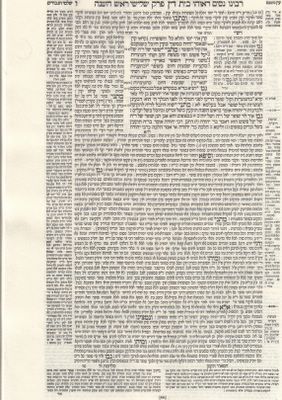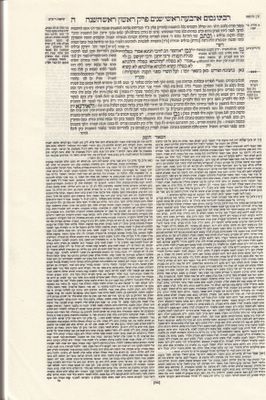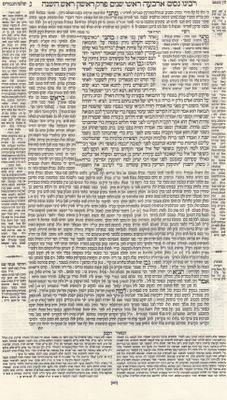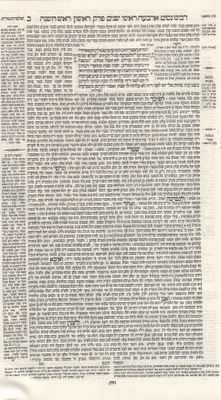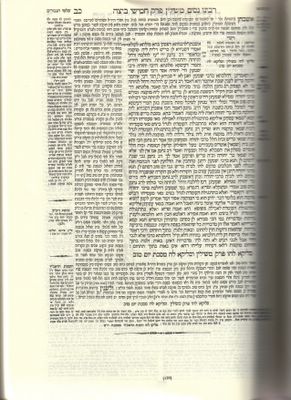
HIDE/SHOW IMAGE
4a
{Rosh Hashana 16b continues}
immediately for life in the next world. And the wholly sinful and written and signed immediately for Gehinnom, for it is written {Daniel 12:2}:
| ב וְרַבִּים, מִיְּשֵׁנֵי אַדְמַת-עָפָר יָקִיצוּ; אֵלֶּה לְחַיֵּי עוֹלָם, וְאֵלֶּה לַחֲרָפוֹת לְדִרְאוֹן עוֹלָם. {ס} | 2 And many of them that sleep in the dust of the earth shall awake, some to everlasting life, and some to reproaches and everlasting abhorrence. {S} |
{Rosh HaShana 17a}
The intermediate people whose sins and merits are equal descend to Gehinnom, where they cry out and then rise up, for it is stated {
Zechariah 13:9}
| ט וְהֵבֵאתִי אֶת-הַשְּׁלִשִׁית, בָּאֵשׁ, וּצְרַפְתִּים כִּצְרֹף אֶת-הַכֶּסֶף, וּבְחַנְתִּים כִּבְחֹן אֶת-הַזָּהָב; הוּא יִקְרָא בִשְׁמִי, וַאֲנִי אֶעֱנֶה אֹתוֹ--אָמַרְתִּי עַמִּי הוּא, וְהוּא יֹאמַר יְהוָה אֱלֹהָי. {פ} | 9 And I will bring the third part through the fire, and will refine them as silver is refined, and will try them as gold is tried; they shall call on My name, and I will answer them; I will say: 'It is My people', and they shall say: 'The LORD is my God.' {P} |
and upon them Chana said {
I Shmuel 2:6}:
| ו ה, מֵמִית וּמְחַיֶּה; מוֹרִיד שְׁאוֹל, וַיָּעַל. | 6 The LORD killeth, and maketh alive; He bringeth down to the grave, and bringeth up. |
And Bet Hillel say: And the Abundant is Mercy {
rav chesed} tilts it {of the intermediate people} towards mercy, and upon them David said {
Tehillim 116}:
| א אָהַבְתִּי, כִּי-יִשְׁמַע ה-- אֶת-קוֹלִי, תַּחֲנוּנָי. | 1 I love that the LORD should hear my voice and my supplications.
|
and upon them is said {our Gemara: David said} the entire
parasha {section}. {until}
דַּלֹּתִי, וְלִי יְהוֹשִׁיעַ - " I was brought low, and He saved me."
{The
derasha appears
most rooted in the next pasuk:
| ב כִּי-הִטָּה אָזְנוֹ לִי; וּבְיָמַי אֶקְרָא. | 2 Because He hath inclined His ear unto me, therefore will I call upon Him all my days. |
interpreting as "because he has tilted his scale for me."}
The intermediate people about whom Bet Hillel said that the Abundant in Mercy tilts {the scales} towards mercy, this is specifically where they did not have amongst their sins that of the sinners of Israel with their bodies. And what is that? The head upon which
tefillin was never placed. But if among the half of his sins there is the sin of the sinners of Israel with their bodies, they descend to Gehinnom and are judged there for 12 months. After 12 months the cry out and rise up, as it written {
Zechariah 13:9}
| ט וְהֵבֵאתִי אֶת-הַשְּׁלִשִׁית, בָּאֵשׁ, וּצְרַפְתִּים כִּצְרֹף אֶת-הַכֶּסֶף, וּבְחַנְתִּים כִּבְחֹן אֶת-הַזָּהָב; הוּא יִקְרָא בִשְׁמִי, וַאֲנִי אֶעֱנֶה אֹתוֹ--אָמַרְתִּי עַמִּי הוּא, וְהוּא יֹאמַר יְהוָה אֱלֹהָי. {פ} | 9 And I will bring the third part through the fire, and will refine them as silver is refined, and will try them as gold is tried; they shall call on My name, and I will answer them; I will say: 'It is My people', and they shall say: 'The LORD is my God.' {P} |
and upon them Chana said {
I Shmuel 2:6}:
| ו ה, מֵמִית וּמְחַיֶּה; מוֹרִיד שְׁאוֹל, וַיָּעַל. | 6 The LORD killeth, and maketh alive; He bringeth down to the grave, and bringeth up. |
But one whose transgressions outweigh his merits, and there is amongst them that of the sinners of Israel with their bodies, and they have transgressed a sin such as a sexual transgression - they descend to Gehinnom and are judged there for 12 months. After 12 months, their body is consumed, their soul is burnt up, and the wind scatters them under the feet of the righteous, for it is stated {
Malachi 3:21}
| כא וְעַסּוֹתֶם רְשָׁעִים--כִּי-יִהְיוּ אֵפֶר, תַּחַת כַּפּוֹת רַגְלֵיכֶם: בַּיּוֹם אֲשֶׁר אֲנִי עֹשֶׂה, אָמַר ה צְבָאוֹת. {פ} | 21 And ye shall tread down the wicked; for they shall be ashes under the soles of your feet in the day that I do make, saith the LORD of hosts. {P} |
But the
minim {
sectarians - Rashi: who change the word of God to bad - } and the
mumrim {apostates}, informers and
apikorsim {who denigrate Torah scholars}, and those who deny Torah and those who deny resurrection of the dead, and those who separate from the ways of the community, and those who place their fear in the world of the living - this refers to the
parnasim {communal leaders} who cast excessive on the community not for the sake of Heaven, and those who sin and cause others to sin, such as Yeroboam ben Navat and his company - descend to Gehinnom and are judged there for generations, as it written {
Yeshaya 66:24 - the very last
pasuk in Yeshaya}
| כד וְיָצְאוּ וְרָאוּ--בְּפִגְרֵי הָאֲנָשִׁים, הַפֹּשְׁעִים בִּי: כִּי תוֹלַעְתָּם לֹא תָמוּת, וְאִשָּׁם לֹא תִכְבֶּה, וְהָיוּ דֵרָאוֹן, לְכָל-בָּשָׂר. {ש} | 24 And they shall go forth, and look upon the carcasses of the men that have rebelled against Me; for their worm shall not die, neither shall their fire be quenched; and they shall be an abhorring unto all flesh. {P} |
Rav Yehuda cited Rav: any communal leader {
parnas} who casts excessive fear of the community not for the sake of heaven will not see a son who is a Torah scholar, for it is stated {
Iyyov 37:24}
| כד לָכֵן, יְרֵאוּהוּ אֲנָשִׁים; לֹא-יִרְאֶה, כָּל-חַכְמֵי-לֵב. | 24 Men do therefore fear Him; He regardeth not any that are wise of heart. {P} |
{taking the first part of the verse not to refer to Hashem, but rather to the
parnas. Thus: Therefore, he whom men fear will not see [as children] any that are wise of heart.}
Micha 7:18:
| יח מִי אֵל כָּמוֹךָ, נֹשֵׂא עָוֹן וְעֹבֵר עַל פֶּשַׁע, לִשְׁאֵרִית, נַחֲלָתוֹ: לֹא הֶחֱזִיק לָעַד אַפּוֹ, כִּי חָפֵץ חֶסֶד הוּא. | 18 Who is a God like unto Thee, that pardoneth the iniquity, and passeth by the transgression of the remnant of His heritage? He retaineth not His anger for ever, because He delighteth in mercy. |
They taught in the academy of Rabbi Yishmael: He passes by the first time, and so is the Attribute. To explain: if one is straight and whole in his ways, if he stumbles in sin, and he does not come to repeat that same sin, Hashem does not write that one down for him, but rather passes it by. And so is the Attribute of Hashem -- not to make him liable initially, as is written {
Iyyon 33:29}:
| כט הֶן-כָּל-אֵלֶּה, יִפְעַל-אֵל-- פַּעֲמַיִם שָׁלוֹשׁ עִם-גָּבֶר. | 29 Lo, all these things doth God work, twice, yea thrice, with a man, |
Rava said: And the sin itself is not erased. For if there is a majority of sins, this is counted among them.
There is an explanation from the Gaon. And their question was regarding this that
they taught in the academy of Rabbi Yishmael that he passes by {the sin} the first time, and this is the Attribute. Rava said: And the sin itself is not erased.
That this of Rabbi Yishmael is established regarding one who fears Heaven, and is always involves in performing
mitzvot, and keeps the strict prohibitions and at times violates the minor prohibitions, the Attribute of Hashem is that He passes by the first ones and forgives him, and he is is the category of the righteous; and the sin itself is not erased, but rather it stand suspended until the time of death. At that time, they calculate - if his merits outweigh these specific sins, these sins are passed by
rishon rishon, and they are not reckoned against him, and it is as if he never did them. But if these are overpowering, and his deeds are found to be, when they are all combined and weighed against each other, that he has mostly demerits, then each one is reckoned against him; and this is the Attribute listed in the ways of Hashem. And this is the explanation of the 6th Attribute in the
parsha of
vaya'avor.
{regarding Shemot 34:
| ו וַיַּעֲבֹר ה עַל-פָּנָיו, וַיִּקְרָא, ה ה, אֵל רַחוּם וְחַנּוּן--אֶרֶךְ אַפַּיִם, וְרַב-חֶסֶד וֶאֱמֶת. | 6 And the LORD passed by before him, and proclaimed: 'The LORD, the LORD, God, merciful and gracious, long-suffering, and abundant in goodness and truth; |
}
וְרַב-חֶסֶד - Bet Hillel say: He tilts it towards mercy. {as interpreted above on the pasuk כִּי-הִטָּה אָזְנוֹ לִי, plus also we are saying that he increases the mercy, thus causing it to tilt towards mercy.}
And this is explained in the
brayta they learned in the academy of Rabbi Yishmael {as above} -
ma'avir {rishon rishon etc}.
And we establish that all of these words are said in the instance in which he dies without repentance, but if he dies with repentance,
none of his sins are remembered, for it is stated {
Yechezkel 33:12}:
| יב וְאַתָּה בֶן-אָדָם, אֱמֹר אֶל-בְּנֵי-עַמְּךָ צִדְקַת הַצַּדִּיק לֹא תַצִּילֶנּוּ בְּיוֹם פִּשְׁעוֹ, וְרִשְׁעַת הָרָשָׁע לֹא-יִכָּשֶׁל בָּהּ, בְּיוֹם שׁוּבוֹ מֵרִשְׁעוֹ; וְצַדִּיק, לֹא יוּכַל לִחְיוֹת בָּהּ--בְּיוֹם חֲטֹאתוֹ. | 12 And thou, son of man, say unto the children of thy people: The righteousness of the righteous shall not deliver him in the day of his transgression; and as for the wickedness of the wicked, he shall not stumble thereby in the day that he turneth from his wickedness; neither shall he that is righteous be able to live thereby in the day that he sinneth. |
but rather Hashem forgives all of his transgressions and places him in the partition of the righteous.
